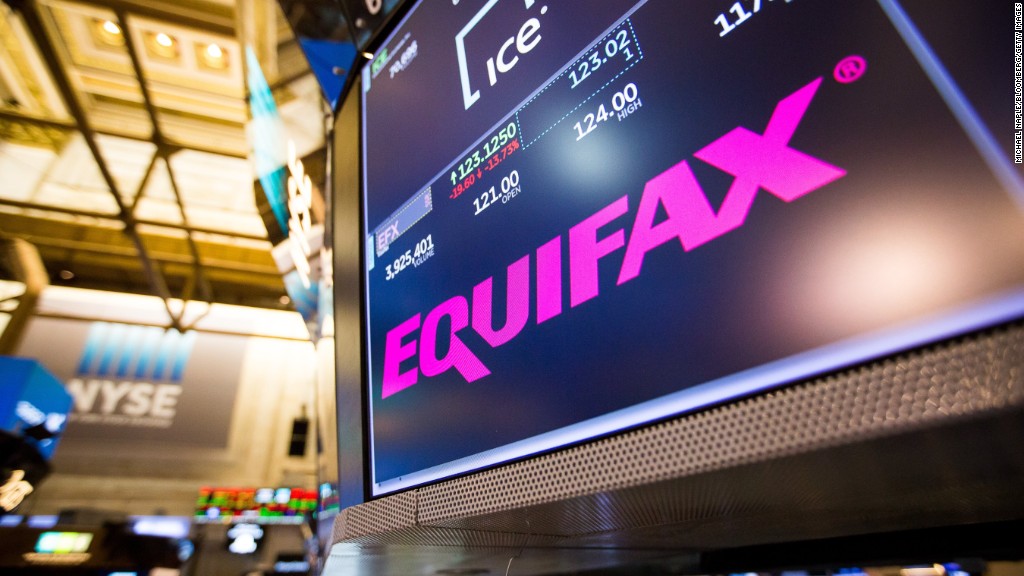
Let's face it. There's a good chance your personal information was exposed during the Equifax data breach.
The names, Social Security numbers, birth dates, addresses, and driver's license numbers for 143 million people may have been accessed. That kind of information could be used by someone else to open bank accounts, credit cards and loans in your name.
The credit card numbers of an additional 209,000 people were also accessed. Those people will be notified directly. Everyone else must go to a website created by Equifax and submit their last name and last six digits of their Social Security number to find out if they were affected.
If you're concerned about whether your information has landed in the hands of hackers, here are five things you can do right now:
1. Check your free credit reports
Under federal law you are allowed to request a free copy of your credit report once a year from each of the three credit reporting agencies: Equifax, Experian, and TransUnion. You can request a copy of your credit report online at www.annualcreditreport.com.
It will tell you if anyone has requested a check on your credit. This happens, for example, if someone tries to open a new credit card or apply for a loan in your name.
But it could take time to show up on your report, so you won't necessarily see any changes right away.
And the report itself won't tell you if there's been money stolen from a bank account or suspicious activity on your credit card, said Liz Loewy, a former Manhattan assistant district attorney who oversaw financial elder abuse and data breach cases for 29 years. She is also the co-founder of EverSafe, a financial technology monitoring platform.
"Sometimes there's theft that never makes it to the credit report," she said.
Related: What you need to know about the Equifax data breach
2. Put a fraud alert on your credit
You can put a fraud alert on your credit reports for free by contacting one of the credit agencies, which is required to notify the other two.
This means you'll be contacted if someone tries to apply for credit in your name.
It will last for 90 days and can be renewed.
3. Keep an eye on bank accounts and credit card statements
Go through all your bank, retirement, and brokerage accounts, as well as your credit card statements to look for any suspicious activity.
"In most cases, theft happens over time. It usually starts small and money is stolen from across your accounts," Loewy said.
So, get in the habit of carefully checking your statements on a regular basis.
Loewy also suggests having someone else help monitor your accounts. This could be a financial adviser or a family lawyer.
4. Sign up for a credit monitoring or identity theft protection service
Monitoring services usually alert you when a company checks your credit history, a new loan or credit card is opened in your name, a creditor says a payment is late, or if public records show you've filed for bankruptcy, according to the FTC.
But keep in mind, most credit monitoring services only track your credit reports. They still won't alert you to suspicious activity on your credit card or in your bank accounts.
Some monitoring services include identity theft protection, which will alert you when your personal information is being used in ways that doesn't show up on your credit report. It could monitor things like utility and cable bills, payday loan applications, and social media.
These services won't prevent fraud from happening. But some do offer identity recovery services to help you regain control of your finances after identity theft occurs. The government offers a free resource for recovering from identity theft at IdentityTheft.gov.
While there is usually a cost involved with a credit monitoring service or identity theft protection, Equifax is offering a free year of credit monitoring through its TrustedID Premier business, regardless of whether you've been affected by the hack.
This will track your credit report from Equifax, as well as your reports from the two other reporting agencies, and alert you to certain changes. TrustedID Premier will also provide free copies of those reports and the ability to lock your Equifax credit report so companies cannot see it. It includes identity theft insurance and it will scan the Internet for use of your Social Security number, too.
Related: Did Equifax's delayed hack disclosure break the law?
5. If you're really worried, put a freeze on your credit
This is an extreme step and might not be necessary, especially if you don't know for sure that you're information was compromised, or what personal information was stolen.
A freeze blocks anyone from accessing your credit reports without your permission. But it can be an inconvenience for you, too. If you want to take out a loan or open a new credit card, you'll have to contact the reporting agency to temporarily lift the freeze. It's also not free. Fees to freeze your account vary by state, but commonly range from $5 to $10.



